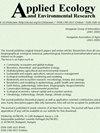棉花早、晚播镉胁迫下形态计量学、气体交换特性及离子吸收评价
IF 0.6
4区 环境科学与生态学
Q4 ECOLOGY
引用次数: 0
摘要
. 镉(Cd)是一种植物不需要的水溶性金属污染物,但由于其对植物的有害影响,其在土壤-植物连续体中的流动性近年来引起了人们的广泛关注。除抑制棉花生长外,还可能引起严重的形态和生理异常。为此,本研究旨在探讨不同浓度Cd对棉花(Gossypium hirsutum L.)生长、形态、生化和生理过程的影响。了解植物对Cd胁迫的形态、生化和生理反应是全面了解植物对Cd胁迫抗性机制的必要条件。通过网房试验,研究了不同播期(即早、晚播期)棉花品种(v1: KL-MNH-142和v2: KL-FH-886)在Cd(250µM、500µM、750µM和1000µM)胁迫下的生长和适应机制。结果表明,高剂量Cd主要在根中积累,导致根生物量减少。播后期,与播前和对照(1.63±0.06)相比,1000µM Cd处理显著降低了v2 (KL-MNH886)的蒸腾速率(1.01±0.04)和气孔气体交换速率(0.01±0.003)。v1播前期根系钙含量(1.4±0.5)低于播后期。此外,Cd(1000µM)处理使v1播后根系可溶性糖(0.13±0.001)较播前和对照显著降低。Cd不仅导致根中花青素含量降低,而且改变了叶绿素含量。研究结果表明,相对于后期,毛草对Cd胁迫的耐受性较好,是修复土壤和生态环境的最佳树种。本文章由计算机程序翻译,如有差异,请以英文原文为准。
APPRAISAL ON MORPHOMETRY, GAS EXCHANGE CHARACTERISTICS, AND IONS UPTAKE UNDER CADMIUM STRESS IN EARLY- AND LATE-SOWN OF COTTON
. Cadmium (Cd) is a water-soluble metal pollutant that is not required for plants, but its mobility in the soil-plant continuum has lately attracted substantial interest due to its harmful effects on plants. It may cause serious morphological and physiological abnormalities in addition to inhibiting cotton growth. Thereby, the present study was conducted to explore the effect of different concentrations of Cd on the growth, morphological, biochemical, and physiological processes of cotton ( Gossypium hirsutum L.) varieties. Understanding the morphological, biochemical, and physiological responses to Cd stress is necessary for a holistic approach to plant resistance mechanisms to Cd stress. A net house experiment was conducted to investigate the growth and adaptation mechanism of G. hirsutum varieties (V 1 : KL-MNH-142 and V 2 : KL-FH-886) with different sowing times (i.e., early and late) under Cd stress (250 µM, 500 µM, 750 µM, and 1000 µM). The results showed that Cd predominately accumulated in the root at a higher dose, which consequently led to a reduction in the root biomass. During the late sowing time, transpiration rate (1.01 ± 0.04) and stomatal gas exchange rate (0.01 ± 0.003) were recorded to be significantly decreased by the application of Cd at 1000 µM to variety V 2 (KL-MNH886) as compared to the early sowing interval and respective control (1.63 ± 0.06). Calcium contents (1.4 ± 0.5) in the root were decreased in the early sowing period in V 1 as compared to the late sowing period. Besides, the application of Cd (1000 µM) has significantly decreased root soluble sugar (0.13 ± 0.001) in V 1 under the late sowing period compared with the early sowing period and respective control. Cd not only led to the decrease in root anthocyanin but also changed the chlorophyll content. Our study proved that G. hirsutum has good tolerance to Cd stress during early time intervals as compared to the late time interval and is the best species for soil and ecological environment restoration.
求助全文
通过发布文献求助,成功后即可免费获取论文全文。
去求助
来源期刊

Applied Ecology and Environmental Research
ECOLOGY-ENVIRONMENTAL SCIENCES
CiteScore
1.40
自引率
14.30%
发文量
104
审稿时长
14 months
期刊介绍:
The Journal publishes original research papers and review articles. Researchers from all countries are invited to publish pure or applied ecological, environmental, biogeographical, zoological, botanical, paleontological, biometrical-biomathematical and quantitative ecological or multidisciplinary agricultural research of international interest on its pages.
The focus is on topics such as:
-Community, ecosystem and global ecology-
Biometrics, theoretical- and quantitative ecology-
Multidisciplinary agricultural and environmental research-
Sustainable and organic agriculture, natural resource management-
Ecological methodology, monitoring and modeling-
Biodiversity and ecosystem research, microbiology, botany and zoology-
Biostatistics and modeling in epidemiology, public health and veterinary-
Earth history, paleontology, extinctions, biogeography, biogeochemistry-
Conservation biology, environmental protection-
Ecological economics, natural capital and ecosystem services-
Climatology, meteorology, climate change, climate-ecology.
The Journal publishes theoretical papers as well as application-oriented contributions and practical case studies. There is no bias with regard to taxon or geographical area. Purely descriptive papers (like only taxonomic lists) will not be accepted for publication.
 求助内容:
求助内容: 应助结果提醒方式:
应助结果提醒方式:


